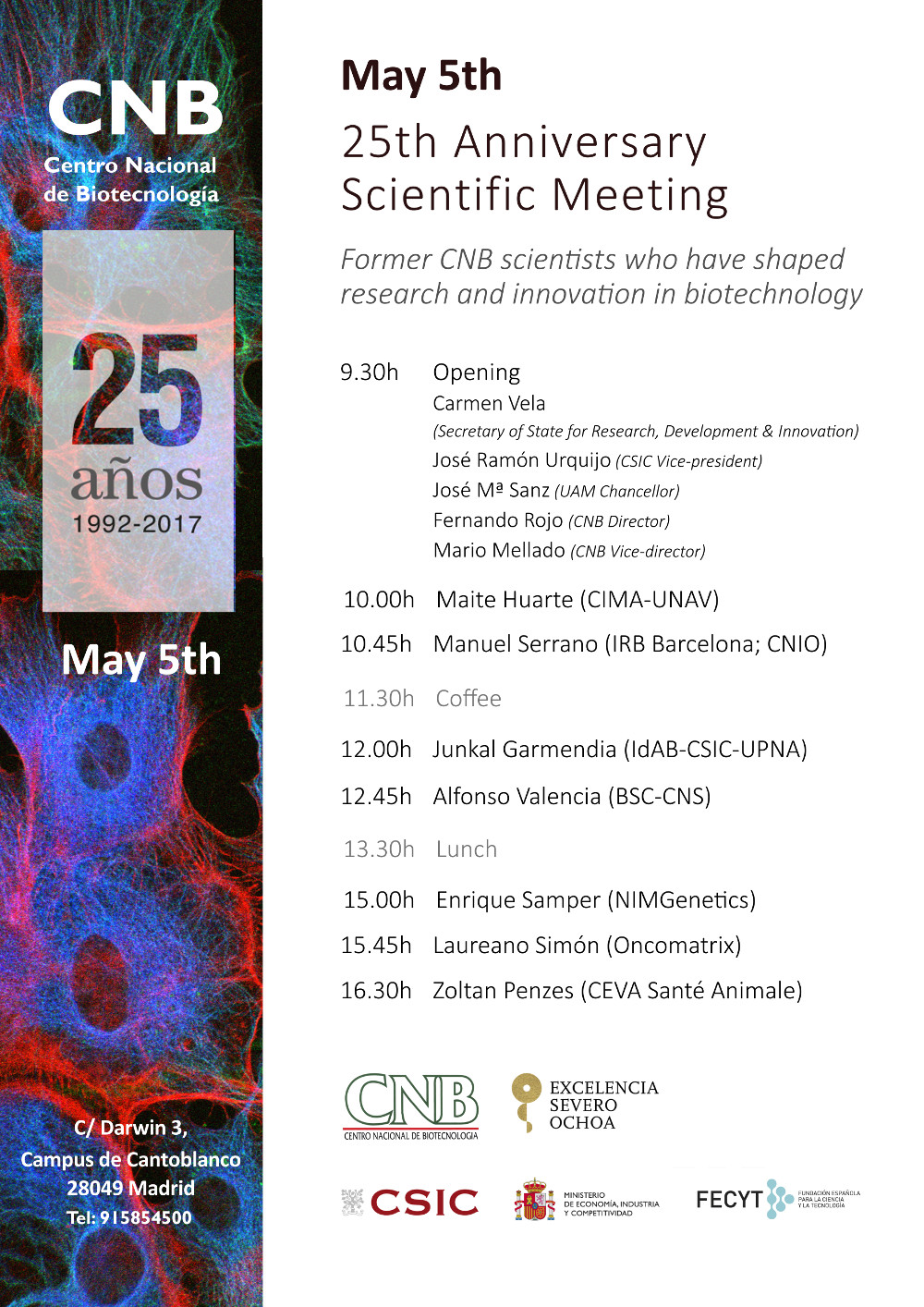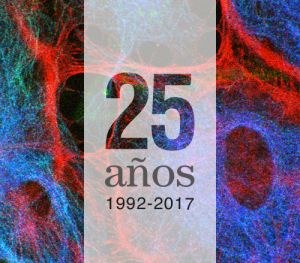 El viernes 5 de mayo se celebrará en el Centro Nacional de Biotecnología del CSIC (CNB-CSIC) un congreso con motivo del 25 aniversario del centro. Siete científicos que se encuentran entre los mayores exponentes de la biotecnología internacional participarán como ponentes invitados. Los siete han pasado parte de su vida profesional previa como investigadores del CNB-CSIC.
El viernes 5 de mayo se celebrará en el Centro Nacional de Biotecnología del CSIC (CNB-CSIC) un congreso con motivo del 25 aniversario del centro. Siete científicos que se encuentran entre los mayores exponentes de la biotecnología internacional participarán como ponentes invitados. Los siete han pasado parte de su vida profesional previa como investigadores del CNB-CSIC.
La presentación de la jornada correrá a cargo de Carmen Vela (Secretaria de Estado de Investigación, Desarrollo e Innovación), Jose Ramón Urquijo (Vicepresidente de Organización y Relaciones Institucionales de CSIC), José María Sanz (Rector de la Universidad Autónoma de Madrid) y Fernando Rojo (Director del CNB-CSIC).
El evento servirá de marco para la inauguración de una exposición que explica la historia del centro y destaca los principales hitos científicos alcanzados en sus laboratorios. La instalación, realizada con la colaboración de la Fundación Española para la Ciencia y la Tecnología y el Ministerio de Economía, Industria y Competitividad, pretende acercar a la población los avances alcanzados gracias a estos 25 años de investigación biotecnológica.
La primera parte del día contará con cuatro científicos reconocidos en todo el mundo que, tras pasar por el CNB-CSIC, han continuado su carrera en otros centros de investigación. A lo largo de la mañana Manuel Serrano (IRB Barcelona y CNIO), Alfonso Valencia (BSC-CNS), Maite Huarte (CIMA-UNAV) y Junkal Garmendia, (IdAb-CSIC-UPNA) hablarán de su trabajo y evolución profesional después de dejar el CNB-CSIC.
En la sesión de la tarde participarán Enrique Samper (NIM Genetics), Laureano Simón (Oncomatrix) y Zoltan Penzes (Ceva Santé Animale), tres ponentes que en la actualidad desarrollan su trabajo en exitosas empresas con base científica.
Desde su fundación el 9 de julio de 1992, el CNB-CSIC ha pasado de tener unas decenas de trabajadores a contar con más de 650 profesionales que trabajan para mejorar la salud, la alimentación y el medio ambiente. Siete directores diferentes han formado parte de la historia del centro que, a día de hoy, está organizado en seis departamentos y cuenta con 70 grupos de investigación.
La jornada pretende celebrar las aportaciones del centro a la ciencia española y reunir a las personas que han hecho posible estos 25 años de investigación en biología y biotecnología.
Los ponentes:
Manuel Serrano: Dirige el laboratorio de supresión de tumores en el CNIO y recientemente se ha incorporado al IRB Barcelona. Fue investigador del CNB-CSIC entre 1997 y 2003. Su investigación se centra en el estudio de los mecanismos celulares de supresión tumoral. Es reconocido internacionalmente por sus descubrimientos sobre los mecanismos celulares de supresión tumoral y protección contra el cáncer.
Alfonso Valencia: Director del Instituto Nacional de Bioinformática en el Barcelona Supercomputing Center-Centro Nacional de Supercomputación. En 1994 se incorporó al CNB-CSIC como jefe del Grupo de Diseño de Proteínas. Su investigación se centra en el desarrollo de herramientas computacionales para el estudio de las redes de interacción entre proteínas que permitan comprender los mecanismos del cáncer.
Maite Huarte: Desde 2011 dirige la línea de investigación de RNAs largos no-codificantes en el cáncer en el CIMA de la Universidad de Navarra. Realizó su tesis doctoral en el Centro Nacional de Biotecnología del CSIC sobre la interacción entre el virus de la gripe y la célula infectada.
Junkal Garmendia: Científico Titular del CSIC en el Instituto de Agrobiotecnología (CSIC‐IdAB) en Navarra, y científico adscrito al Centro de Investigación Biomédica en Red Enfermedades Respiratorias (CIBERES). Se licenció en Biología en 1996 en la Universidad de Navarra y realizó la Tesis Doctoral en el Centro Nacional de Biotecnología (CSIC‐CNB).
Enrique Samper: Socio Fundador de NIMGenetics, una empresa biomédica privada española especializada en el diseño y comercialización de productos y servicios de diagnóstico clínico genético. Desarrolló su tesis doctoral en el CNB-CSIC.
Laureano Simón: Fundador y CEO de Oncomatryx, empresa dedicada al desarrollo de tratamientos personalizados para atacar los tumores invasivos. Trabajó como investigador en el CNB-CSIC.
Zoltan Penzes: Director en CEVA Santé Animale, un laboratorio francés de salud veterinaria, centrado en la investigación, desarrollo, producción y comercialización de productos farmacéuticos y vacunas para animales de compañía, ganado, cerdos, equinos y aves de corral. Trabajó como investigador del CNB-CSIC entre 1995 y 1998.






